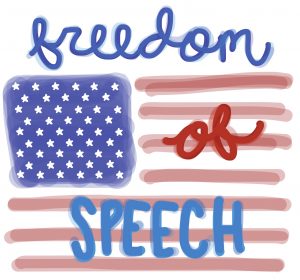Opposing
Why might Americans oppose aspects of the freedom of speech?
November 28, 2019
Although many Americans are adamant supporters of the First Amendment, there are also those who find flaws in the freedom of speech.
First, they may point out that “freedom of speech” doesn’t actually guarantee the freedom to all speech (rightfully so). There are four types of speech in the U.S. not covered by the First Amendment, including: making a threat against an individual, defaming others, plagiarizing copyrighted material, or sharing obscene material. Of course, these exceptions seem reasonable to not be protected by the First Amendment, but people do like to remind others that freedom of speech doesn’t actually warrant complete freedom of speech.
In addition, ConnectUs explains how freedom of speech can also lead to the spread of false information: “Thanks to the rise of the Internet, the freedom of speech makes it easier for individuals to spread false information and outright lies, but then still pretend that this data is true.” This type of speech is protected under the First Amendment because it does not fit under any of the categories above, but obviously an abundance of problems can come from false information or fake news. From incorrect medical facts to erroneous details about an event that occurred, this can lead to not only an uninformed (or rather incorrectly informed) nation and also further issues such as people choosing whether or not to vaccinate their children based on information found online.
Although not all speech is protected by the “freedom of speech,” this fundamental right can easily lead to violence and hate speech. Of course, violence is a crime, but shouldn’t the person who evokes the violence through hate speech or inappropriate comments also hold some responsibility (ConnectUs)?
Going along with the previous point, Natalie Regoli, editor-in-chief of ConnectUs, makes a valid point about verbal abuse: “Voltaire’s biographer summed up the views of the philosopher like this: ‘I don’t agree with what you say, but I will defend to the death your right to say it.’ When freedom of speech is treated this way, then it creates a situation where people must endure sexist or racist verbal abuse. Is it really beneficial for society to allow individuals to use derogatory terms for the purpose of causing discomfort?” While we may not want a society full of antifragile and unchallenged individuals (I encourage you to read The Coddling of the American Mind by Jonathan Haidt and Greg Lukianoff), it’s difficult to deny that some types of verbal abuse can lead to a sharp decline in mental health and a society of depressed and fearful people.
Freedom of speech can also create a divided and polarized society, which we are all witnessing in America today. Of course, hundreds of factors and years have led to the division between political parties in the United States, but freedom of speech has certainly contributed. Regoli explains this concept: “People tend to hang out in circles where others think and feel in similar ways, which means they will gather around like-minded individuals to spend most of their time. . . When there are ideological silos created from free speech, it eventually polarizes society into groups that struggle to get along with each other.”
This can lead to a stubborn society of individuals that are unable to compromise and truly communicate with one another. According to Pew Research Center, 28% of people believe it is important to live in a place where most people share their political views, and for people that are “consistently conservative,” 63% claim that the majority of their friends share the same political opinions. Pew Research Center also found that people who are consistently loyal to one of the two major political parties often begin to view the definition of compromise differently.
“Instead of believing that both sides must have a give-and-take to create an outcome, the definition becomes one in which their side gets what they want while the other side gets as little as possible. This perspective makes it a challenge for society to function because those on each extreme are consistently battling the other extreme because each views themselves as being the superior contributor to society,” said Regoli (information taken from Pew Research Center).
Those who find flaws in the freedom of speech also make valid arguments. They aren’t anti-American or against the rights enumerated in the Constitution, but they simply want to ensure that our great nation is one that can still compromise, communicate, empathize, and treat each other with respect.







